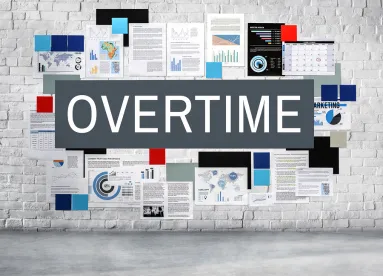On August 31, 2017, a federal judge in Texas invalidated highly controversial proposed revisions to federal overtime regulations that were supposed to go into effect on December 1, 2016. The same judge previously had issued a nationwide temporary injunction blocking the regulations and placing their future in question.
The proposed regulations would have more than doubled the minimum salary requirement for the major white-collar exemptions under the Fair Labor Standards Act (FLSA) from $455 per week to $913 per week. Annualized, that would have been an increase in the salary threshold from $23,660 per year to $47,476 per year.
Judge Amos L. Mazzant III, a federal judge for the Eastern District of Texas, issued a temporary injunction blocking the implementation just before Thanksgiving. That ruling currently is on appeal to the United States Court of Appeals for the Fifth Circuit, although the parties to the appeal now have filed a motion to stay the appeal and to hold it in abeyance.
On August 31, Judge Mazzant granted summary judgment to the business plaintiffs in the litigation, holding that the updated salary test in the final rule was inconsistent with congressional intent. Under the FLSA, Congress gave the U.S. Department of Labor (DOL) the authority to issue regulations that define and delimit the meaning of “any employee employed in a bona fide executive, administrative, or professional capacity.” But by setting such a high salary level for the executive, administrative, and professional (EAP) exemptions, the DOL overstepped its bounds, according to the judge.
In his summary judgment ruling, Judge Mazzant found that the DOL’s 2016 revision to the regulations “makes overtime status depend predominately on a minimum salary level, thereby supplanting an analysis of an employee’s job duties.” He also wrote:
The Final Rule more than doubles the Department’s previous minimum salary level, increasing it from $455 per week ($23,660 annually) to $913 per week ($47,476 annually). This significant increase would essentially make an employee’s duties, functions, or tasks irrelevant if the employee’s salary falls below the new minimum salary level. As a result, entire categories of previously exempt employees who perform “bona fide executive, administrative, or professional capacity” duties would now qualify for the EAP exemption based on salary alone. The text of the Final Rule confirms this: “White collar employees subject to the salary level test earning less than $913 per week will not qualify for the EAP exemption, and therefore will be eligible for overtime, irrespective of their job duties and responsibilities.” Defining and Delimiting the Exemptions for Executive, Administrative, Professional, Outside Sales and Computer Employees, 81 Fed. Reg. 32,391, 32,405 (May 23, 2016) (emphasis added).
One of the concerns raised by Judge Mazzant’s preliminary injunction decision was that it could have been interpreted as holding that the DOL could not set any minimum salary level as one of the tests for determining whether an individual is exempt from overtime under the executive, administrative, or professional exemptions. In his latest ruling, Judge Mazzant acknowledged that his preliminary injunction order could have been confusing. He also clarified in footnotes that he was not passing judgment as to whether the DOL could or could not include a salary test, stating, “This opinion is not making any assessments regarding the general lawfulness of the salary-level test or the Department’s authority to implement such a test.”
Takeaways
The practical takeaway from this summary judgment decision is that employers can feel much more comfortable that the minimum salary threshold in the 2016 final regulations will not go into effect retroactively or at some date in the near future. The proposed regulations were issued by the DOL under President Obama, and it was the Obama DOL that filed the appeal of the preliminary injunction to the Fifth Circuit. Alexander Acosta, who is the Secretary of Labor under President Trump, continued to pursue the appeal in an effort to confirm that the DOL does have the authority to set a minimum salary level in light of Judge Mazzant’s injunction order. Indeed, in a reply brief filed with the Fifth Circuit in June, the federal government asked the Fifth Circuit to uphold the DOL’s authority to set a minimum salary level but to abstain from ruling on the lawfulness of the salary level contained in the 2016 regulations. With Judge Mazzant now having stated that he was not making any assessments as to the general lawfulness of a salary level test or of the DOL’s authority to issue such a test, there should be little to no incentive for the DOL to appeal this summary judgment ruling.
The other practical takeaway is that although the salary level threshold for the EAP exemptions is not likely to increase to $913 per week under the Trump administration, an increase in the minimum salary level still is likely sometime in the future. Secretary Acosta has made various statements indicating that he believes the minimum salary level should be higher than the current $455 per week, and annualized likely should be in the $30,000 to $35,000 range. The DOL under Secretary Acosta recently issued a highly detailed Request for Information (RFI) for purposes of new rulemaking related to these overtime regulations, including several questions related to salary levels. Comments in response to the RFI are due no later than September 25.




 />i
/>i

